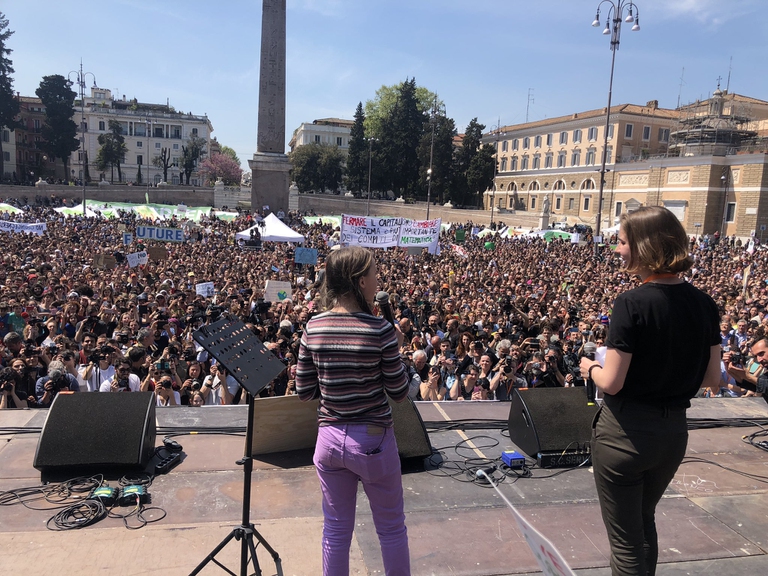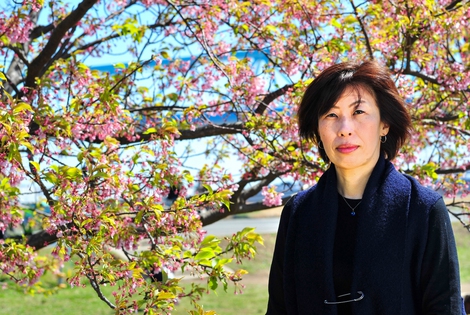
Three people putting the protection of the planet before themselves. Three powerful stories from Latin America, the deadliest region for environmental activists.
What Greta Thunberg said and did in Rome, where she participated in Fridays for Future’s strike, encouraging young people to keep fighting for the climate.
Greta Thunberg, the Swedish activist that is galvanising young people all over the world to mobilise in the name of the planet and against climate change, participated in the strike for the climate organised by the Rome chapter of the Fridays for Future movement, inspired by Thunberg’s example and enthusiasm, that took place on the 19th of April in the central Piazza del Popolo. This happened on the third day of her tour in Italy, which began after reaching the southern European country from her home city, Stockholm, by train. Over the course of three days, she met with Pope Francis as well as institutional figures within the Italian Senate, where she captured politicians’ attention with her speech, even though she expressed harsh criticism towards them in it (watch and read the full speech below).
Over the course of the protest, organised by Fridays for Future Rome, which saw the participation of 25,000 people, mostly students, Greta Thunberg went onstage together with her friend, Belgian activist Anuna De Wever, on the frontline of the movement in Brussels. Together they underlined what they’ve been repeating since the movement started when, on the 20th of August last year, Thunberg decided to strike for the climate in front of the Swedish parliament in Stockholm.
The two activists also underlined how the goal of this mobilisation isn’t to “take selfies” or receive the praise of people in power, but to push institutions to undertake real, concrete changes, to be carried out as quickly as possible, in order to mitigate the effects of global warming already taking place.
After visiting the Vatican on the 17th of April, Thunberg was invited by the president of the Italian Senate, Elisabetta Casellati, to participate in a conference on the topic of climate change that took place the following day in Madama Palace (the seat of the Senate of the Italian Republic). This is the full text of the speech she gave in front of a room full of people: adherents of Fridays for Future, journalists and politicians.
“My name is Greta Thunberg, I’m sixteen years old, I come from Sweden and I speak on behalf of future generations. In the year 2030 I’ll be 26 years old, my little sister Beata will be 23. ‘That is a great age,’ we’ve been told, ‘where you have all of your life ahead of you’, but I’m not sure it will be that great for us. I was fortunate to be born in a time and place where everyone told us to dream big, I could become whatever I wanted to, I could live wherever I wanted to. People like me had everything we needed and more. Things our grandparents couldn’t even dream of, we have everything we could ever wish for, yet now we may have nothing. Now we probably don’t even have a future anymore.
Because that future was sold so that a small number of people could make unimaginable amounts of money, it was stolen from us every time you said that the sky was the limit and that you only live once. You lied to us, you gave us false hope, you told us the future was something to look forward to. And yes, some of us can have whatever we want, for now. Many of us can buy much more than we’ll ever need. But the only thing we really need is a future. The saddest part is that many children aren’t even aware of what fate we’re facing. We won’t understand it until it’s too late.
Around the year 2030, 10 years, 257 days, 13 hours away from now we’ll be in a position where we set off an irreversible chain reaction beyond human control, that will most likely lead to the end of our civilisation as we know it. That is unless in that time, permanent and unprecedented changes in all aspects of society have taken place, including a reduction of CO2 emissions by at least 50 per cent. And please note that these calculations are depending on inventions that haven’t yet been invented at scale, inventions that are supposed to clean our atmosphere of astronomical amounts of CO2. Furthermore, these calculations don’t include unforeseen tipping points and feedback loops like the extremely powerful methane gas escaping from the rapidly thawing Arctic permafrost. Nor do these scientific calculations include already locked in warming hidden by air pollution nor the aspects of equity and climate justice clearly stated throughout the Paris Agreement which is absolutely necessary to make it work on a global scale, we must also bear in mind that there are just calculations, estimations, which means that these points of no return may occur a bit sooner or later than that, no one can know for sure.
We can however be certain that they will occur approximately in these timeframes, because these calculations aren’t opinions or wild guesses, these projections are backed up by scientific facts. Concluded by all nations through the IPCC. Nearly every major scientific body in the world unreservedly supports the work and findings of the IPCC. Many people say we don’t have any solutions to the climate crisis, and they’re right of course, because how could we, how do you solve the greatest crisis humanity has ever faced, how do you solve a war? How do you solve going to the moon for the first time? How do you solve inventing new inventions?
The climate crisis is both the easiest and the hardest issue we have ever faced, the easiest because we know what we must do: we must stop the emission of greenhouse gas. The hardest because our current economics are totally dependent on burning fossil fuels, and thereby destroying ecosystems in order to create an everlasting economic growth. So, exactly how do we solve that you ask us? The children school striking for the climate. And we say no one knows for sure but we have to stop burning fossil fuels and restore nature and many other things we may not have quite figured out yet. Then you say that’s not an answer, and we say, we have to start treating the crisis like a crisis and act even if we don’t have all the solutions. That’s still not an answer you say. Then we start talking about the circular economy and rewilding nature and the need for a just transition and then you just stare back at us because you don’t understand what we’re talking about. We say that all the solutions needed aren’t known to anyone and therefore we must unite behind the science and find them together along that way, but you don’t listen to that because those answers are for solving a crisis that most of you don’t even fully understand or want to understand.
You don’t listen to science because you’re only interested in solutions that will enable you to carry on like before, like now. But those answers don’t exist anymore because you didn’t act in time. Well, change is coming whether you like it or not. Science doesn’t care about unimaginable amounts of money or this comfortable lifestyle that you’re so desperately trying to protect. The atmosphere only cares about how many tonnes of greenhouse gas we pump into the atmosphere. Greenhouse gas emissions, that’s it, nothing else. Avoiding climate breakdown will require cathedral thinking, we must lay the foundation while we may not know exactly how to build the ceiling. It’s like in 1962 when John F. Kennedy said that we chose to go to the moon and then did it within that decade though everyone said it was impossible. It’s like the Marshall Plan of WW2 or like how within 24 hours of Notre Dame catching fire, people had already raised over half a billion euros to rebuild it. Sometimes we just simply have to find a way.
The moment we decide to fulfil something we can do anything and I’m sure the moment we start behaving like we were in an emergency we can avoid climate catastrophe. Humans are very adaptable, but the opportunity to do so won’t last for long, therefore we must start today, we have no more excuses. When I’ve been travelling around to speak in different countries I’m always offered help to write about the specific climate policies in specific countries. But that’s not necessary because the basic problem is the same everywhere, and the basic problem is that basically nothing is being done to halt or even slow climate breakdown. Despite all the beautiful words and promises. The main difference is that some countries talk more than others about how good they are, but the truth is that there are no role models today.
When I travel around, I often meet important people and when they talk to me, they always congratulate me. I find that very strange, I honestly have no idea why they would do that. During the last six months I’ve travelled around Europe for hundreds of hours on trains, electric cars and buses talking about how we need to start treating this crisis as a crisis because we can’t solve an emergency without treating it as an emergency. In the last six months millions of school children all around the world, not least in Italy, have been school striking for the climate. But nothing has changed, in fact the emissions are still rising. And to be honest, there’s no change whatsoever in sight, so why would they congratulate me? We children aren’t sacrificing our education and our childhood for you to tell us what you consider politically possible in the society you’ve created, we haven’t taken to the streets for you to take selfies with us and tell us that you really admire what we do. We children are doing this to wake adults up, we children are doing this to get you to act, we children are doing this because we want our hopes and dreams back. Thank you”.
Siamo anche su WhatsApp. Segui il canale ufficiale LifeGate per restare aggiornata, aggiornato sulle ultime notizie e sulle nostre attività.
![]()
Quest'opera è distribuita con Licenza Creative Commons Attribuzione - Non commerciale - Non opere derivate 4.0 Internazionale.
Three people putting the protection of the planet before themselves. Three powerful stories from Latin America, the deadliest region for environmental activists.
Influential scientist, activist and author Vandana Shiva fights to protect biological and cultural diversity, and against GMOs.
Kimiko Hirata has blocked 13 new coal plants in Japan, but she hasn’t done it alone. The 2021 Goldman Prize winner tells us about her movement.
The Goldman Environmental Prize, the “green Nobel Prize”, is awarded annually to extraordinary activists fighting for the well-being of the planet.
We talk to Shaama Sandooyea, activist and marine biologist from Mauritius onboard Greenpeace’s Arctic Sunrise ship in the heart of the Indian Ocean.
Arrested for supporting farmers. The alarming detention of Disha Ravi, a 22-year-old Indian activist at the fore of the Fridays for Future movement.
Water defender Eugene Simonov’s mission is to protect rivers and their biodiversity along the borders of Russia, China and Mongolia.
Chibeze Ezekiel, winner of the 2020 Goldman Environmental Prize for Africa, is fighting to guide new generations towards a renewable future.
Leydy Pech, winner of the 2020 Goldman Environmental Prize for North America, is the beekeeper who defended Mexican Maya land against the agro-industry.








